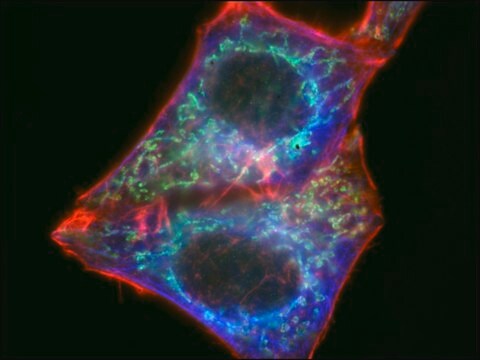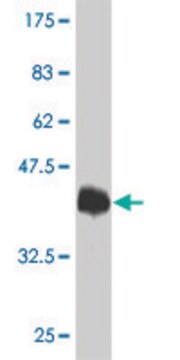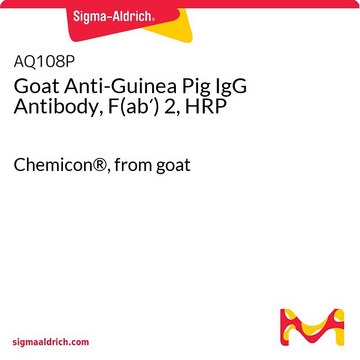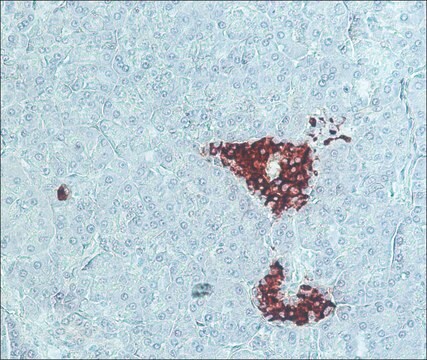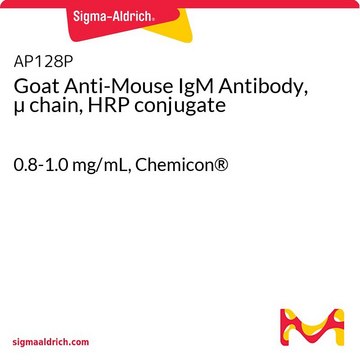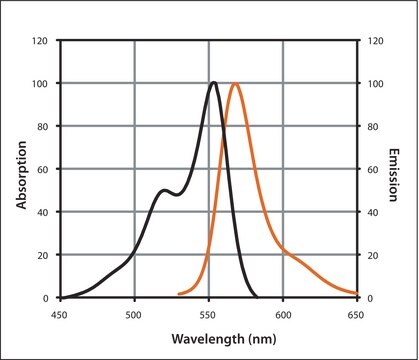AP108P
Goat Anti-Guinea Pig IgG Antibody, HRP conjugate
Chemicon®, from goat
Sign Into View Organizational & Contract Pricing
All Photos(1)
About This Item
UNSPSC Code:
12352203
eCl@ss:
32160702
NACRES:
NA.46
Recommended Products
biological source
goat
Quality Level
conjugate
peroxidase conjugate
antibody form
F(ab′)2 fragment of affinity isolated antibody
antibody product type
secondary antibodies
clone
polyclonal
species reactivity
guinea pig
manufacturer/tradename
Chemicon®
technique(s)
ELISA: suitable
western blot: suitable
shipped in
wet ice
target post-translational modification
unmodified
Related Categories
General description
Immunoglobulin G (IgG) is the most common type of antibody in the human serum. It exists in four isotypes IgG1, IgG2, IgG3, and IgG4. IgG is produced by the B cells. IgG structure contains four polypeptide chains with two identical heavy (H) chains and two identical λ light (L) chains. These chains are inter-linked by disulfide bonds.
Application
Goat Anti-Guinea Pig IgG Antibody, HRP conjugate has been used in immunoblot analysis and enzyme-linked immunosorbent assay (ELISA) (1:2000).
Biochem/physiol Actions
Immunoglobulin G (IgG) initiates the classical pathway of the complement system. It neutralizes virus particles and toxins. IgG plays an essential role in antibody-dependent cell-mediated cytotoxicity (ADCC). Maternal IgG is transferred to the fetus through the placenta that is crucial for protecting newborns against infectious diseases. Levels of IgG in severe acute respiratory syndrome coronavirus (SARS‐CoV)‐2 infected patients can be used as a potential tool to evaluate the severity and prognosis of coronavirus disease 2019 (COVID‐19).
Legal Information
CHEMICON is a registered trademark of Merck KGaA, Darmstadt, Germany
Disclaimer
Unless otherwise stated in our catalog or other company documentation accompanying the product(s), our products are intended for research use only and are not to be used for any other purpose, which includes but is not limited to, unauthorized commercial uses, in vitro diagnostic uses, ex vivo or in vivo therapeutic uses or any type of consumption or application to humans or animals.
Not finding the right product?
Try our Product Selector Tool.
Storage Class Code
11 - Combustible Solids
WGK
WGK 3
Certificates of Analysis (COA)
Search for Certificates of Analysis (COA) by entering the products Lot/Batch Number. Lot and Batch Numbers can be found on a product’s label following the words ‘Lot’ or ‘Batch’.
Already Own This Product?
Find documentation for the products that you have recently purchased in the Document Library.
Anna Frappaolo et al.
Cell death & disease, 13(11), 1003-1003 (2022-11-27)
The oncoprotein GOLPH3 (Golgi phosphoprotein 3) is an evolutionarily conserved phosphatidylinositol 4-phosphate effector, mainly localized to the Golgi apparatus, where it supports organelle architecture and vesicular trafficking. Overexpression of human GOLPH3 correlates with poor prognosis in several cancer types and
Outbreak of human metapneumovirus detected by use of the Vero E6 cell line in isolates collected in Yamagata, Japan, in 2004 and 2005.
Abiko, C; Mizuta, K; Itagaki, T; Katsushima, N; Ito, S; Matsuzaki, Y; Okamoto et al.
Journal of Clinical Microbiology null
Identification of GOLPH3 Partners in Drosophila Unveils Potential Novel Roles in Tumorigenesis and Neural Disorders
Sechi S, et al.
Cells, 10, 2336-2336 (2021)
Pauravi J Gandhi et al.
Cells, 10(10) (2021-10-24)
Chronic pain is a debilitating condition involving neuronal dysfunction, but the synaptic mechanisms underlying the persistence of pain are still poorly understood. We found that the synaptic organizer glutamate delta 1 receptor (GluD1) is expressed postsynaptically at parabrachio-central laterocapsular amygdala
Molecular and cellular evidence for the alternative lengthening of telomeres (ALT) mechanism in chicken.
O'Hare, TH; Delany, ME
Cytogenetic and genome research null
Our team of scientists has experience in all areas of research including Life Science, Material Science, Chemical Synthesis, Chromatography, Analytical and many others.
Contact Technical Service